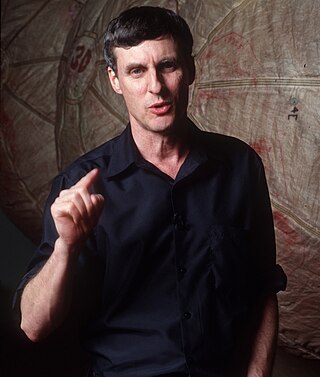
Steven Weldon Squyres is an American geologist and planetary scientist. He was the James A. Weeks Professor of Physical Sciences at Cornell University in Ithaca, New York. His research area is in planetary sciences, with a focus on large solid bodies in the Solar System such as the terrestrial planets and the moons of the Jovian planets. Squyres was the principal investigator of the Mars Exploration Rover Mission (MER).

Michael Landon Gernhardt is a NASA astronaut and manager of the Environmental Physiology Laboratory, and principal investigator of the Prebreathe Reduction Program (PRP) at the Lyndon B. Johnson Space Center.

The Aquarius Reef Base is an underwater habitat located 5.4 mi (8.7 km) off Key Largo in the Florida Keys National Marine Sanctuary, Florida, United States. It is the world's only undersea research laboratory and it is operated by Florida International University. It is deployed on the ocean floor 62 ft (19 m) below the surface and next to a deep coral reef named Conch Reef.

Underwater habitats are underwater structures in which people can live for extended periods and carry out most of the basic human functions of a 24-hour day, such as working, resting, eating, attending to personal hygiene, and sleeping. In this context, 'habitat' is generally used in a narrow sense to mean the interior and immediate exterior of the structure and its fixtures, but not its surrounding marine environment. Most early underwater habitats lacked regenerative systems for air, water, food, electricity, and other resources. However, some underwater habitats allow for these resources to be delivered using pipes, or generated within the habitat, rather than manually delivered.
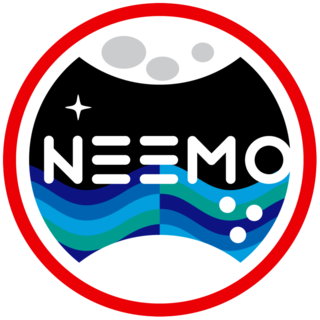
NASA Extreme Environment Mission Operations, or NEEMO, is a NASA analog mission that sends groups of astronauts, engineers and scientists to live in the Aquarius underwater laboratory, the world's only undersea research station, for up to three weeks at a time in preparation for future space exploration.
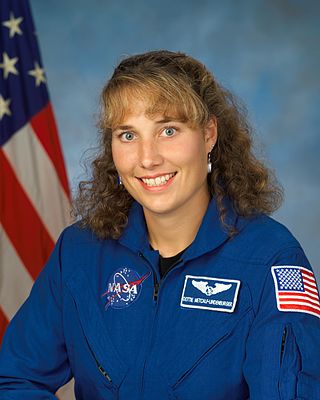
Dorothy Marie "Dottie" Metcalf-Lindenburger is a retired American astronaut. In 2000, she married Jason Metcalf-Lindenburger, a fellow Whitman College graduate and educator, from Pendleton, Oregon, and they now have one daughter together. She was a science teacher at Hudson's Bay High School in Vancouver, Washington when she was selected in 2004 as an educator mission specialist. Her parents are Joyce and Keith Metcalf, who reside in Fort Collins, Colorado. She was the first Space Camp alumna to become an astronaut.

Kimiya Yui is a Japanese astronaut from the Japan Aerospace Exploration Agency (JAXA). He was selected for the agency in 2009.

Josef F. Schmid is a German-American physician, NASA flight surgeon and a major general in the United States Air Force Reserves. He served as an aquanaut on the joint NASA-NOAA NEEMO 12 underwater exploration mission in May 2007. On 8 October 2021 he became one of the first humans to be Holoported off the planet and into space, visiting the International Space Station by telepresence.
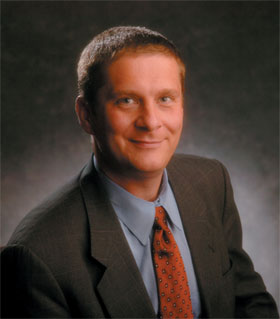
Timothy J. Broderick, F.A.C.S., is Professor of Surgery and Biomedical Engineering at the University of Cincinnati, where he has served on the faculty since 2003. He also serves as Chief of the Division of Gastrointestinal and Endocrine Surgery and is Director of the Advanced Center for Telemedicine and Surgical Innovation (ACTSI). He has flown on the NASA KC-135 parabolic laboratory and dived in the NASA Extreme Environment Mission Operations (NEEMO) program to develop advanced surgical technologies for long duration space flight.
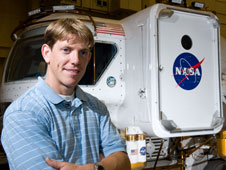
Dr. Andrew Frank Jorgensen Abercromby is a scientist and biomedical engineer who designs and tests spacesuit systems and exercise countermeasures for future exploration of the Solar System. He is employed by NASA as Lead of the Human Physiology, Performance, Protection & Operations (H-3PO) Laboratory at Johnson Space Center in Houston, Texas. As an aquanaut, Abercromby served as a member of the NASA Extreme Environment Mission Operations 14 crew. Abercromby has more than fifteen years of experience working in the Human Health and Performance (HH&P) and Engineering Directorates at the Johnson Space Center. He is married with two daughters.

Steven Patrick Chappell is an American aerospace engineer. He is a Technical Lead & Research Specialist for Wyle Integrated Science & Engineering at NASA's Johnson Space Center (JSC) in Houston, Texas. He is helping to define and execute the research needed to optimize human performance in next-generation spacesuits and extra-vehicular activity (EVA) systems. Chappell served as an aquanaut on the NASA Extreme Environment Mission Operations 14 crew.

William Laurence Todd is a Project Manager for Exploration Analogs at NASA's Johnson Space Center (JSC) in Houston, Texas. He has also served as a NASA Undersea Research Team Project Lead and Spaceflight Training Simulation Supervisor at NASA JSC. Todd is a veteran Aquanaut of 5 missions. In 2001, he commanded the first NASA Extreme Environment Mission Operations (NEEMO) mission, a joint NASA-NOAA program to study human survival in the Aquarius underwater laboratory in preparation for future space exploration.
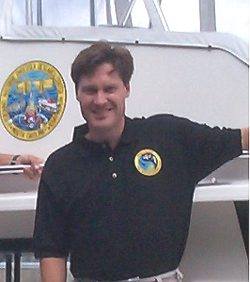
Marcum "Marc" Reagan is a Station Training Lead in Mission Operations at NASA's Johnson Space Center in Houston, Texas. He leads a team of instructors who together are responsible for developing and executing complex simulations for International Space Station (ISS) assembly and operations. Reagan also serves as an ISS "Capcom" from Mission Control, communicating with ISS astronauts in orbit. In May 2002, Reagan served as an aquanaut on the NASA Extreme Environment Mission Operations 2 crew. He subsequently served as Mission Director for multiple NEEMO missions.
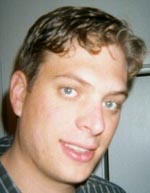
Jonathan Robert Dory is a Human Systems Integration Lead at NASA's Johnson Space Center (JSC) in Houston, Texas. He is Branch Chief of NASA's Habitability and Human Factors Branch, part of the Habitability and Environmental Factors Division at NASA/JSC. Dory supports crew safety and productivity on the International Space Station (ISS) Program by planning and assessing the on-orbit interior configuration of ISS, as well as performing anthropometric analysis of crew tasks. He contributes to the integrated operation of the Space Station while using 3D computer graphics and animation software as part of his daily work. In July 2002, Dory served as an aquanaut on the NASA Extreme Environment Mission Operations 3 crew.

Karen Kohanowich is a retired U.S. Naval officer and ocean research and technology program manager for the National Oceanic and Atmospheric Administration (NOAA)'s Office of Ocean Exploration and Research (OER). She was NOAA's Acting Director of the National Undersea Research Program (NURP) from 2006 to 2009, and served in various roles at OER, including Acting Deputy and Undersea Technology director, until retiring in 2018. In July 2006, she became an aquanaut on the NASA Extreme Environment Mission Operations 10 crew.

Dewey Dewayne Smith was an underwater diver, former United States Navy medic and professional aquanaut. He died during a dive from the Aquarius underwater habitat off Key Largo in May 2009. A subsequent investigation determined that multiple factors combined to cause the accident.
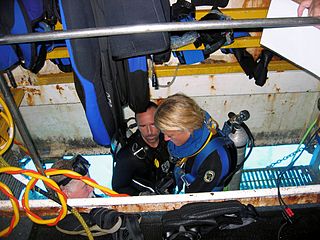
Craig B. Cooper is a professional aquanaut from the United States who served from 1991 to 2010 as Operations Manager for the Aquarius Reef Base underwater habitat. Cooper is known to fellow divers by the nickname "Coop".

James Raymond Talacek is an American professional aquanaut with the University of North Carolina Wilmington (UNCW). He serves as Oceanographic Field Operations Manager at Aquarius Reef Base, the world's only undersea research laboratory.

Mark Whitney Hulsbeck is an American professional aquanaut. He serves as an Oceanographic Operations Field Manager and research diver for the Aquarius Reef Base, the world's only undersea research laboratory, operated by Florida International University. Hulsbeck is nicknamed "Otter".

Justin Brown is an American professional aquanaut with the University of North Carolina Wilmington (UNCW). He serves as a habitat technician at Aquarius Reef Base, the world's only undersea research laboratory.






















